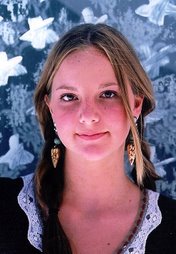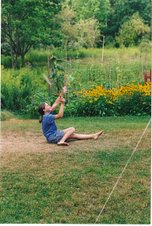I think more of the luminous ways that Elizabeth was alive. How alive she was when she was trying on clothes, and looking for something new to wear. How alive she was when talking on the phone, and laughing with friends. How alive she was when reading, or writing, or doing her homework. All of these things pointed to a normal long life. How ordinary in some ways she was, growing up with two parents, lots of relatives, lots of friends, a passion for photography and the world of images. She was a discerning reader, and was developing an inordinate fondness for Faulkner.
But she was an ordinary kid, wanting to eat the cookie dough off the spoon when the baking was done. She loved ice cream, and her dad allowed her a lot of it insisting it would provide her her calcium requirements.
She loved people. She went out of her way as a young girl to be friendly. In early childhood, when she was a student in preschool, she learned how to answer the phone at reception. (Was this the beginning of her lifelong love of the telephone?)
Dear Elizabeth
Just a note to say that we are having unseasonably warm weather, the cats are restless, I am off work as it is Columbus Day, and thinking, that is what I do when I have time to do it, thinking of what a fine human being you were. You wanted to give money to that homeless man and his dog when you were nine and we passed them on the way to school every day. You were making things for your friends as soon as you learned how to make things, like pillows. Your to do lists were full of items that you wanted to give to your friends, or to your boyfriend.
But besides your generosity, and open heart, you were funny, and you loved to laugh, and we had some good times watching movies together. I wonder what you would have thought of Ryan Gosling's banner year. I wonder if you would have defended Clooney's dud movie. It is a little game I play when I think of you. What you would have made of this and that that has happened since you died.
The tears have not dried.
But besides your generosity, and open heart, you were funny, and you loved to laugh, and we had some good times watching movies together. I wonder what you would have thought of Ryan Gosling's banner year. I wonder if you would have defended Clooney's dud movie. It is a little game I play when I think of you. What you would have made of this and that that has happened since you died.
The tears have not dried.
Subscribe to:
Posts (Atom)
How Dina Aunty relished her memories. Mummy and Daddy were the same, talking about their yesterdays and smiling in that sad-happy way while selecting each picture, each frame from the past, examining it lovingly before it vanished again in the mist. But nobody ever forgot anything, not really, though sometimes they pretended, when it suited them. Memories were permanent. Sorrowful ones remained sad even with the passing of time, yet happy ones could never be re-created—not with the same joy. Remembering bred its own peculiar sorrow. It seemed so unfair: that time should render both sadness and happiness into a source of pain.
> From A Fine Balance by Rohinton Mistry
> From A Fine Balance by Rohinton Mistry













